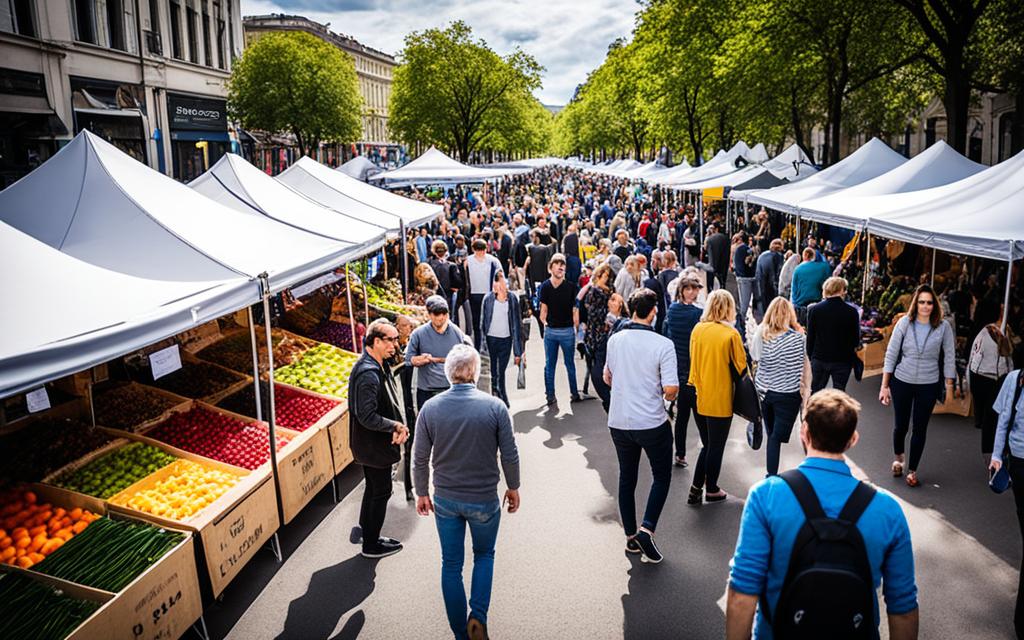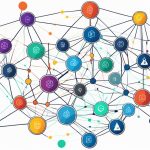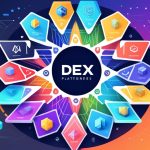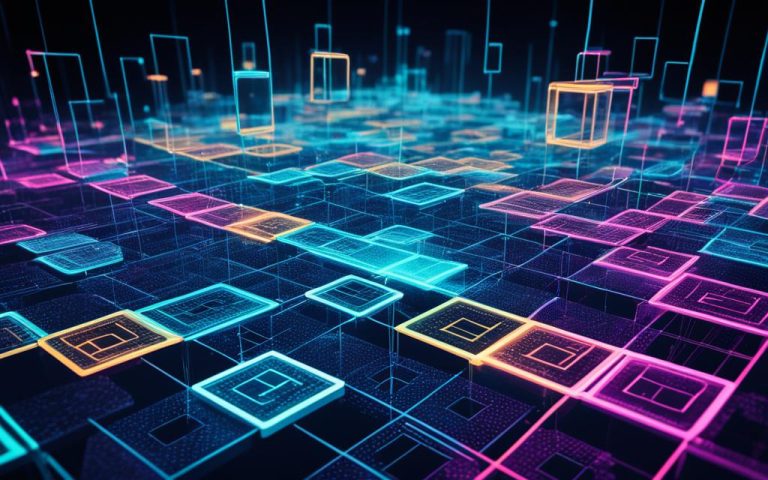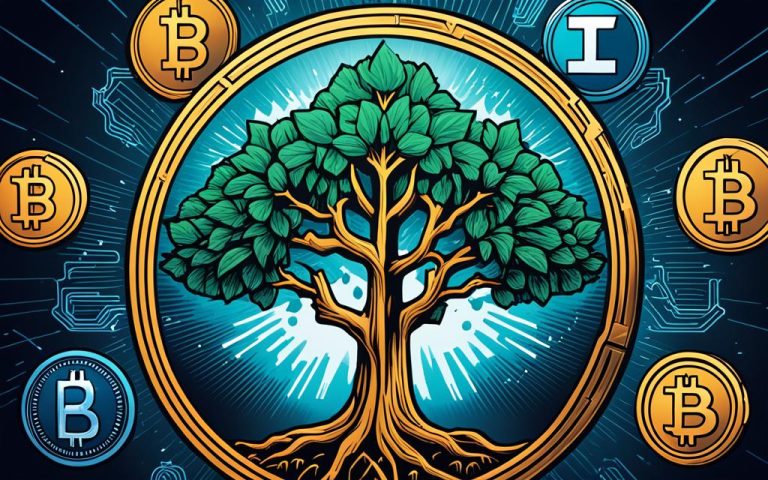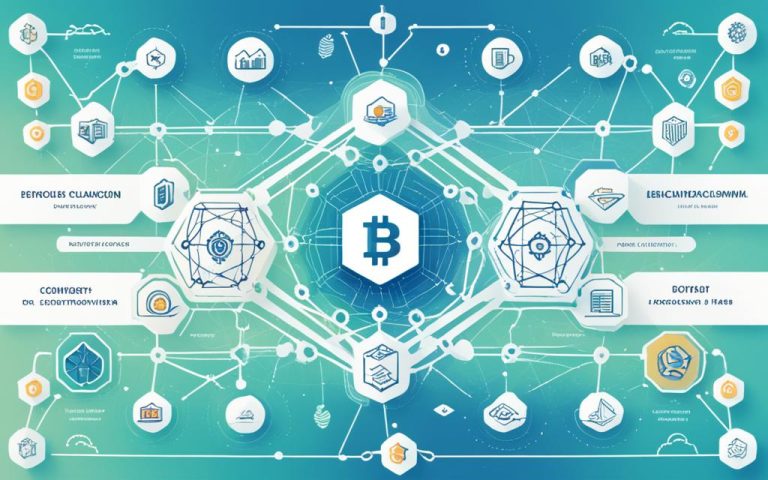Today, decentralized markets are changing the finance world. They don’t rely on middlemen or central places for trades. This setup lets investors deal directly with each other, changing how we do business.
So, what are decentralized markets? They’re online spaces that use decentralized currencies like Bitcoin and Ether. They don’t have a central control point. Rather, they use technology to show prices in real-time. This allows people from all over to buy and sell.
One big plus of these markets is transparency. Every deal is on a public record for others to see. This builds trust and cuts out the need for go-betweens. It also makes trading cheaper and more efficient.
Decentralized markets aren’t just about money. For instance, real estate is using these platforms to make buying and selling direct. The forex market is another example. It lets traders get currency prices from different dealers worldwide.
But, these markets do have downsides. The lack of central control can lead to security issues and fraud. It also makes it hard for regulators to keep things fair for everyone involved.
Still, the future of decentralized markets looks bright. They offer big opportunities for both people and companies. If you’re interested in investing or the future of finance, exploring these markets is a thrilling step forward.
The Rise of Decentralized Finance (DeFi)
In recent years, DeFi or decentralized finance has changed how we see money. It uses blockchain to make financial systems open and lets people manage their money themselves. This means you can deal directly with others without needing a bank.
Unlike traditional finance, DeFi doesn’t depend on central places run by officials. It gets rid of middlemen. This lets you talk about interest rates directly, which saves money and adds security and freedom.
The base of DeFi is blockchain technology. This tech creates a safe and open record of transactions. It lets everyone see the financial moves without changing them.
When you join DeFi, you use a cryptocurrency wallet. This holds your money’s keys online. With these keys, you can borrow, lend, or trade in DeFi apps without banks.
DeFi offers many tools that are becoming popular. Decentralized exchanges, like Uniswap, let people trade directly. There are also lending services like Aave and Compound. They allow you to lend or borrow money easily.
But, DeFi has its risks, such as hacking. These risks show the need for better online security. DeFi’s open nature also makes it hard to control and track down financial crimes.
Even with problems, DeFi challenges big exchanges by offering cheaper and private trading. Upgrades and new tech are making DeFi safer and easier to use. This could mean big changes for how everyone handles money.
DeFi is growing and could change our financial world. Its direct trading, low costs, and safety attract those wanting more from their money.
Related Links:
- Decentralized Finance (DeFi) – Investopedia
- The Rise of Decentralized Finance (DeFi) –
- Exploring the Future Systems of Decentralized Finance (DeFi) –
The Components and Goals of DeFi
Decentralized Finance (DeFi) changes traditional finance with blockchain. It uses cryptocurrencies, smart contracts, and software to improve financial activities.
The Components of DeFi
DeFi’s foundation includes cryptocurrencies, blockchain, and apps. Cryptocurrencies allow value exchange in the DeFi world.
Blockchain ensures these transactions are secure, transparent, and permanent. It uses a network of computers to protect and verify transactions.
Software apps, or DApps, let users interact with DeFi. They can lend, borrow, trade, and make payments easily.
The Goals of DeFi
DeFi sets to achieve several goals beyond traditional finance.
- Accessibility: It makes financial services available worldwide, even for those without bank access. This creates new financial opportunities for many.
- Low Fees: DeFi cuts out middlemen, reducing fees for users. This way, more of the value stays with the user.
- Security: Blockchain and cryptography make DeFi secure against attacks and fraud. Its decentralized nature further enhances security.
- Transparency: All DeFi transactions are recorded on the blockchain for clear, auditable records. While transparent, transactions still ensure user privacy.
DeFi gives power back to people by removing intermediaries. It opens global markets, ensuring a secure, inclusive financial system. However, users should beware of risks like hacks and scams in DeFi. Despite its potential, it’s important to research and proceed with caution in DeFi transactions.
Conclusion
Decentralized finance, or DeFi, is changing how we think about money. It challenges old financial systems. DeFi opens up new chances for people to join a clear and open financial world.
DeFi is growing fast, moving into areas like trading and loans. It offers options beyond the usual financial paths. This change can mean lower costs, quicker deals, and easier access for everyone.
Yet, DeFi isn’t without its problems. Hack attacks and little oversight are big concerns. So, doing your homework before diving in is key.
The future of DeFi depends on better tech, rules, and more users. As these improve, a fairer financial system could be on the horizon.
DeFi is exciting, but being careful is key. Recognize the risks and make smart choices. This way, folks can help shape the future of finance together.
FAQ
What is a decentralized market?
A decentralized market lets people trade directly without a central exchange. Virtual markets using cryptocurrencies, like bitcoin and ether, are examples of this.
How do decentralized markets display bid/ask prices?
They use digital tools to show real-time prices. This means buyers and sellers can see the latest prices and decide wisely.
Can buyers and sellers transact securities in decentralized markets?
Yes, they allow transactions without being physically together. This lets people from all over engage in the market.
Is real estate an example of a decentralized market?
True, real estate is a type of decentralized market. Here, buyers and sellers deal directly, bypassing middlemen.
What is the forex market?
The forex market is decentralized, letting investors view currency quotes globally. It’s for trading various currencies.
What is decentralized finance (DeFi)?
DeFi brings finance online using cryptocurrencies and blockchain. It aims to let people access financial services directly, avoiding traditional banks.
What are the components of DeFi?
DeFi is built on cryptocurrencies, blockchain technology, and peer-to-peer software. Blockchain records transactions securely, and cryptocurrency wallets keep private keys for accessing tokens.
What advantages does DeFi offer?
DeFi’s benefits include easy access, low costs, good interest rates, safety, clearness, and independence. It opens financial activities to everyone, without central banks.
What are some examples of DeFi applications?
DeFi apps include decentralized exchanges, e-wallets for money, lending platforms, and stablecoins. These let people do financial dealings on their own.
What are the risks associated with DeFi?
DeFi’s newness brings risks like hacks, less protection for users, and legal issues. One should research well and know the risks before diving in.

